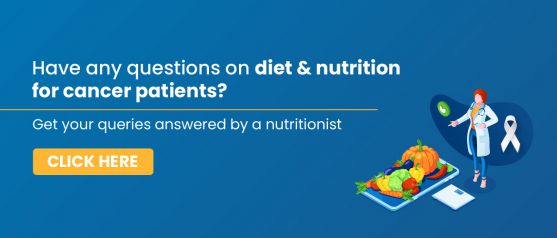If you or your loved one is going through chemotherapy, then you will need to adjust your diet to ensure maximum success of your treatment.
Chemotherapy might weaken your immune system. Some patients lose weight during this treatment. An ideal chemo diet will help you manage these issues, and should be followed before, during and after chemotherapy.
A good chemo diet will do the following:
- Provide sufficient calories for weight maintenance
- Provide overall strength
- Optimise the immune system
- Improve tolerance towards the treatment
In addition to this, we also need to understand that many patients also face some side-effects of chemotherapy. The degree could vary and not everyone has all the side-effects. Some patients may not even feel any of these side-effects.
The common side-effects include vomiting, diarrhea, constipation, loss of appetite and extreme tiredness. These side-effects make it difficult for the patient to consume and retain the required calories.
Here we look at what to include in your diet to ensure the maximum success of your treatment and a speedy recovery.
How much do you need to eat?
On an average, per day, a person on chemotherapy needs to consume:
Proteins
1.2 – 1.5 gms for each kg of your body weight
For example, if your body weight is 50 kg, then you need to have 65 gms of protein per day.
Examples of proteins to include are eggs, chicken, paneer, lentils etc.
Carbohydrates
About 55% of your total calorie intake needs to be from carbohydrates.
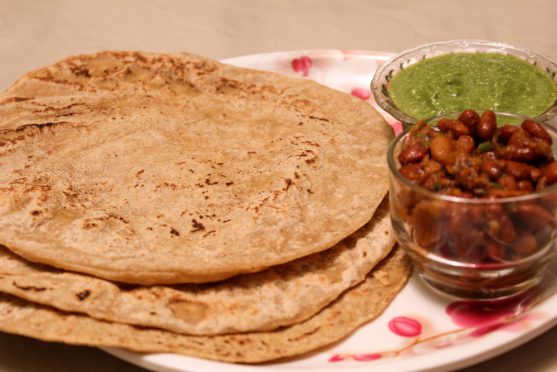
Jowar rotis are a good source of carbohydrates
Examples of carbohydrates to include are wheat, rice, bajra, jowar etc.
Fats
30% of your total calorie intake needs to be from fats.
Examples of fats to include are milk, cheese, cooking oil, nuts, peanut butter etc.
If you suffer from other conditions like hypertension (high BP), diabetes etc, you will need to further customise your diet based on those requirements.
Generally, a high protein diet is recommended during cancer treatment to help with tissue repair and recovery.
What are the best sources of protein?
If you are a non-vegetarian, you can include lean meats like chicken, fish and eggs. Avoid red meats and processed meats like sausages.
If you are a vegetarian, then you can include all pulses like green gram, masoor dal, tur dal etc.
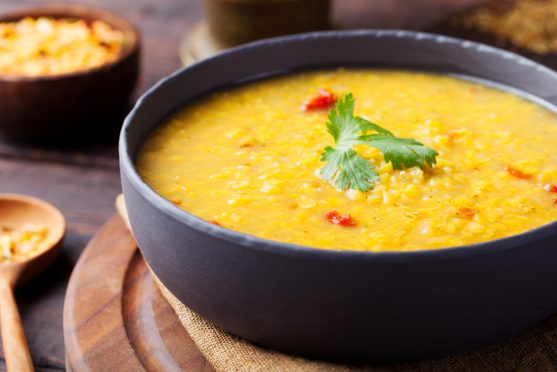
Dals are a good vegetarian source of proteins
Here are some important tips on protein consumption during cancer:
- Include nuts like almonds, cashew nuts, walnuts, peanuts etc.
- Include milk and milk products like cheese, curd, and paneer.
- An important point here is that your body needs to absorb the proteins you consume. Excessive stress can have a direct impact on your pancreas, causing inflammation and this affects the absorption of proteins. It’s important to reduce your stress, to enable the body to absorb the proteins in your diet.
- Consuming excessive amounts of tea and coffee can also impact the absorption of protein in your body. Limit your intake to 2 -3 cups per day.
- Over-eating, or eating too often will prevent the body from digesting your food properly. It is best to eat after a gap of two or three hours, instead of eating on an hourly basis.
- Eating salads or fruits like kiwi, pineapple, papaya, and mangoes before your meal will increase the production of digestive enzymes and help in better absorption of proteins.
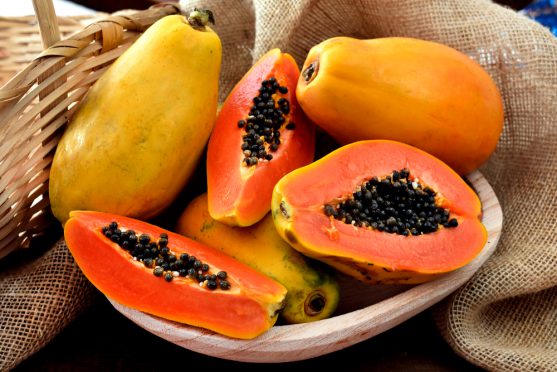
Papaya before meals helps absorb proteins
You can find some high-protein breakfast recipes here.
What to eat when you feel like vomiting
Nausea (feeling like you might vomit) is a very common complaint among those under-going chemotherapy. It prevents them from eating more and if they vomit, they might lose precious calories that they consumed.
It is important to understand what kind of foods reduce this feeling so that you can continue to consume the required calories and nutrition.
Bland foods are key to reducing nausea. Bland foods refer to foods that are not spicy, and are soft to touch.
|
If you have nausea |
|
|
Eat |
Avoid |
|
Soft, toasted bread |
Spicy curries |
|
Lassi / Smoothies |
Oranges, lemons |
|
Curd |
Milk |
|
Oats |
Fried foods |
| Cornflakes |
Fizzy drinks |
|
Ice-cream |
Coffee |
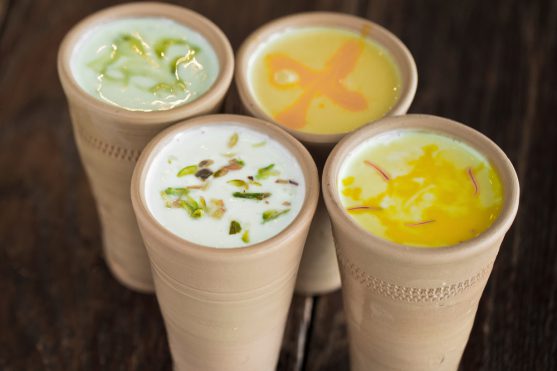
Lassi can reduce nausea
Here are some more easy tips to reduce nausea:
- Start the day with dry foods like biscuits or crackers, even before having water or tea/coffee.
- Ginger helps reduce nausea. You can consume it as ginger tea, or as candy (if you are not diabetic).
- Strong smells might increase nausea. So staying away from the kitchen might help. Also serve them the food in a well-ventilated room.
- It’s found that foods served cold or at room temperature are more easily consumed by them, when compared to very hot foods. So you can try serving ice-cream, cold juiced, smoothies etc.
Senior Dietician Dr Krishna Priya explains how to control nausea:
What to eat if you have diarrhea
Diarrhea is another common side-effect of chemotherapy. To reduce diarrhea, a low fibre diet, with smaller, more frequent meals is recommended.
Let’s understand what a low fibre diet is. Foods that move quickly through the digestive system, like raw fruits and vegetables, legumes (dals, peas etc) are considered high-fibre. These need to be avoided during diarrhea.
Take more foods with soluble fibres and pectins, like white rice, oats, apple, barley, rice water etc.
|
If you have diarrhea |
|
|
Eat |
Avoid |
|
White rice |
Raw fruits |
|
Rice water |
Raw vegetables |
|
Apples |
Lentils (dals) |
|
Barley |
Chickpeas (chana) |
|
Oats |
Beans (kidney beans, soybeans etc) |
| Curd |
Sweets |
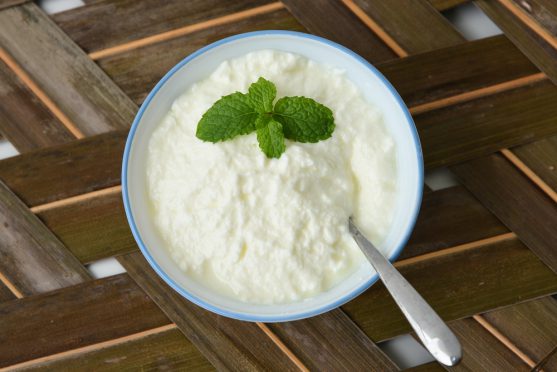
Curd can reduce diarrhea
Diarrhea can cause fluid loss from your body and this might lead to dehydration. To prevent this, it is important to drink lots of water. You can also have plenty of tender coconut water, buttermilk and black tea.
You can use these recipes for drinks that prevent dehydration.
What to eat when you have constipation
In contrast to the recommended diet for diarrhea, constipation can be reduced with a high-fibre diet.
|
If you have constipation |
|
| Eat |
Avoid |
|
Raw fruits (specially fruits with skin and seeds) |
Processed flour (maida) |
|
Sprouts |
Milk |
| Lentils (all dals) |
Cheese |
|
Chickpeas (chana) |
Fried foods |
| Beans (kidney beans, soybeans etc) |
Eggs |
|
Nuts |
Red meat |
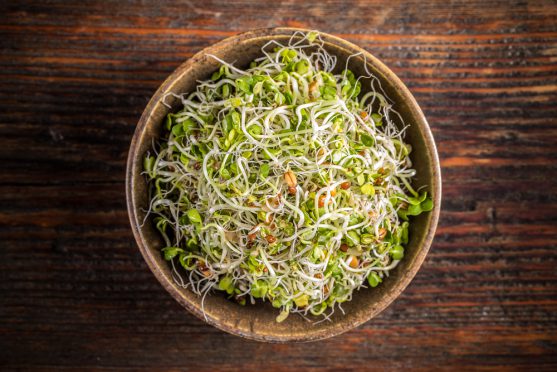
Sprouts can reduce constipation
For constipation as well, drink plenty of water. You can also try hot beverages like light tea, of warm milk or warm water first thing in the morning.
You can also include fibre supplements which can be mixed with fruit juices or porridges.
Physical activity is important to reduce constipation.
Food safety is important
Those who are on chemo are more susceptible to food-borne infections and food poisoning. So ensure that food safety is observed at all times:
- Avoid raw milk and choose pasturised milk.
- When using milk, products like curd and buttermilk ensure that they are made from pasturised milk.
- Make sure that all water is well-filtered or boiled. Same goes for the water used in drinks like juices, smoothies etc.
- Stick to home-made food to ensure food safety at all times.
If you are experiencing gas, bloating, cramping, diarrhea etc, then it might help to avoid dairy products.
Is it safe to consume tea, green tea and coffee at this time?
Green tea is good for health, but like regular tea and coffee, it too contains caffeine. If taken in large quantities, caffeine can give you sleeplessness, headache and an upset stomach.
Caffeine also decreases the absorption of iron in your body, which could then lead to anemia. In some, it could even cause liver toxicity.
Consumption of two cups of green tea per day is suitable and even desirable. Instead of taking more caffeine, you could try some dark chocolate, nuts etc.
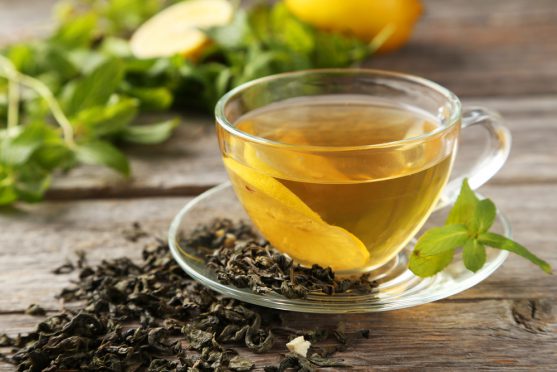
Two cups of green tea daily is good
Is sugar bad for cancer patients?
It is a myth that sugar promotes the growth of cancer cells. Some cancer patients are completely avoiding sugar and even carbohydrates, due to the misconception that this will stop the growth of cancer cells.
When you are on cancer treatment, it is important to maintain a high calorie diet to help with weight maintenance. At a time when you are already trying to manage various side-effects like loss of appetite and fatigue, completely avoiding sugar and carbs will do more harm than good.
The problem with sugar is that it gives us empty calories. It is always better to consume more vitamins and nutrients than empty calories, as these help your body stay strong during cancer treatment.
It is good for cancer patients to limit the amount of sugar in their diet and focus on getting more nutrients. But if you are malnourished, with significant weight loss, then you can safely include 3 to 4 teaspoons of sugar in their diet daily, even during chemotherapy.
If you suffer from diabetes then, of course, you should avoid sugar and follow the instructions of your doctor.
If you are not diabetic, then there is no harm in consuming 3 to 4 teaspoons of sugar per day.
You can download a complete week’s meal plan for cancer patients from here.

